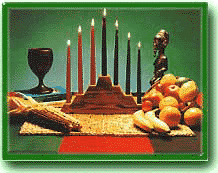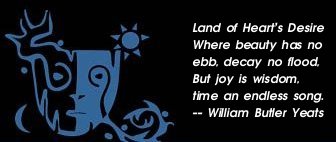|

The Many Meanings of Kwanzaa
By Vincent Jones
Vincent Jones is the President of the American Research Center in Egypt which is an organization
that does research on Ancient Egypt and the conservation of monuments. He is also the CEO of Dynasty Entertainment Group, Inc.
and he has produced several projects for film and television. Jones is a new member of the Mythic Imagination Institute's
Leadership Team.

Have you ever felt as if your life lacks meaning? Have you ever felt as if there was nothing particularly unique
about you? Well, imagine being part of group of people in the United States that felt as if they didn't belong in
mainstream society, as if their world was different from the world of the majority of Americans. During the turbulent
sixties, millions of African-Americans struggled with these types of issues, and most had internal conflicts over basic
questions about identity. Should they call themselves Negroes, Blacks, Afro-Americans, or something else? In the
midst of such debates, there was a dire need in the African-American community to try to define themselves, and
the images that they felt truly represented them. Therefore, a holiday was created to help African-Americans and
others find meaning in their lives, and give them a brand new sense of identity.
A holiday called Kwanzaa was created by Dr Maulana Ron Karenga in 1966 to help African-Americans reconnect
to the elements of their culture that had been lost over the years. In essence, the founder wanted people to be
able to reach back across time and space and embrace the values and principles that made them great in the past.
Kwanzaa is celebrated by millions of people every year from December 26th to January 1st.
Since the inception of the holiday, the intent was for people to move away from some of the more commercial
trappings of other holidays that were celebrated during the season and recognize the importance of self-development.
This in and of itself makes Kwanzaa a very unique celebration even though it has several similarities to other celebrations.
The founders stated that Kwanzaa entailed "reassessment, reclaiming, recommitment, remembrance, retrieval, resumption,
resurrection, and rejuvenation of the 'Way of Life' principles recognized by African-Americans." Therefore the holiday's
goal was to bring true meaning to the lives of people.
The focus of the holiday centered around seven principles called Nguzo Saba. These principles actually helped the
participants rededicate themselves to strengthening their family ties. When you recognize the wonderful contributions
that your grandparents, mothers, fathers, brothers, sisters, aunts, uncles and cousins have made in your life, you can begin to
understand the depth of this holiday. Therefore, the ultimate goal of the Kwanzaa was to become more than just a
holiday, but a way of life.
There are seven primary symbols of Kwanzaa that serve as tools to provide instructive and inspirational information.
The key principles are MKEKA (M-kay-cah), and it's a straw mat that items are placed on. It symbolizes the foundation on
which all else rests. KINARA (Kee-nah-rah) is the candle-holder which holds seven candles. It represents the miracle of
reproduction and birth. Lastly, MSHUMAA (Mee-shoo-maah) represents the Seven Principles (Nguzo Saba) on which society
is built.
In the celebrations, each day has a special social and spiritual meaning. According to the Kwanzaa Information center,
the days are:
- UMOJA (UNITY) (oo-MOE-jah) - To strive for and maintain unity in the family, community, nation and race.
- KUJICHAGULIA (SELF DETERMINATION) (koo-jee-cha-goo-LEE-ah) - To define ourselves, name ourselves, create for
ourselves and speak for ourselves.
- UJIMA (COLLECTIVE WORK AND RESPONSIBILITY) (oo-JEE-mah) - To build and maintain our community together
and to make our brothers' and sisters' problems our problems and to solve them together.
- UJAMAA (COOPERATIVE ECONOMICS) (oo-JAH-mah) - To build and maintain our own stores, shops and other
businesses and to profit together from them.
- NIA (PURPOSE) (nee-AH) - To make as our collective vocation the building and developing of our community in
order to restore our people to their traditional greatness.
- KUUMBA (CREATIVITY) (koo-OOM-bah) - To do always as much as we can, in the way that we can, in order to
leave our community more beautiful and beneficial than when we inherited it.
- IMANI (FAITH) (ee-MAH-nee) - To believe with all our hearts in our parents, our teachers, our leaders, our people
and the righteousness and victory of our struggle.
Therefore, by applying the principles of Kwanzaa to your life, people could discover meaning in their lives and the
lives of others. They would be able to accentuate their best qualities, and help others to do the same. So by approaching
life differently, you could obtain the results that you desire.
Although Kwanzaa was specifically designed to help African-Americans reconnect to their families and develop a positive
way of life, I believe that the principles transcend culture and complexion, and can be shared by humanity. If people worldwide
could embrace the principles that Kwanzaa espouses, and dedicate themselves to their family and community, mankind could
begin to take the first true steps toward greatness.
Return to Passages Menu
|

